|
|
|
Sort Order |
|
|
|
Items / Page
|
|
|
|
|
|
|
| Srl | Item |
| 1 |
ID:
151503
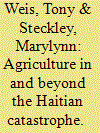

|
|
|
|
|
| Summary/Abstract |
Although the devastation from Haiti’s 2010 earthquake was concentrated in Port-au-Prince, it had deep agrarian roots. This paper situates Haiti’s urban poverty in the chronic exploitation of the country’s peasant classes as a basis for assessing the competing contemporary visions for agricultural development. We argue that the post-earthquake reconstruction has fortified a neoliberal development that is incompatible with the aspirations of the Haitian peasantry. Given the interrelated power of domestic elites and international donors, and the proliferation of disconnected development projects, we conclude that any prospect for pro-poor development hinges on the growth and collaboration of peasant movements.
|
|
|
|
|
|
|
|
|
|
|
|
|
|
|
|
| 2 |
ID:
151497
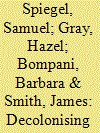

|
|
|
|
|
| Summary/Abstract |
Academics in high-income countries are increasingly launching development studies programmes through online distance learning to engage practitioner-students in low-income countries. Are such initiatives providing opportunities to critically tackle social injustice, or merely ‘mirroring’ relations of global inequality and re-entrenching imperial practices? Building on recent scholarship addressing efforts to ‘decolonise development studies’ and the complex power dynamics they encounter, we reflect on this question by analysing experiences of faculty and students in a United Kingdom-based online development studies programme, focusing particularly on perspectives of development practitioner-students working from Africa. We discuss barriers to social inclusivity – including the politics of language – that shaped participation dynamics in the programme as well as debates regarding critical development course content, rethinking possibilities for bridging counter-hegemonic development scholarship with practice-oriented approaches in a range of social contexts. Our analysis unpacks key tensions in addressing intertwined institutional and pedagogic dilemmas for an agenda towards decolonising online development studies, positioning decolonisation as a necessarily unsettling and contested process that calls for greater self-reflexivity.
|
|
|
|
|
|
|
|
|
|
|
|
|
|
|
|
| 3 |
ID:
151496
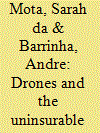

|
|
|
|
|
| Summary/Abstract |
This paper engages with the security dynamics underlying the use of drones and their impact on security subjects – individuals and groups that are the ultimate recipients of specific security policies, regardless of whether these have beneficial effects on them. Using Mark Duffield’s distinction between the insured Global North and the non-insured Global South, this paper discusses how drones generate a radical dissociation between the intervener and the intervened that ultimately produces new security environments at the margins of the international system. These new security environments are defined by the articulation between space, technologies and bodies: bodies of invisible subjects; bodies that are uninsurable.
|
|
|
|
|
|
|
|
|
|
|
|
|
|
|
|
| 4 |
ID:
151499
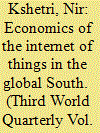

|
|
|
|
|
| Summary/Abstract |
While the Internet of Things (IoT) is not new, its key components are becoming increasingly affordable now, which makes the technology extremely attractive for the Global South. By collecting data from various IoT sources, combining them with data from other sources and using big data analytics, decisions can be made and actions can be taken that can have important economic, social, ecological and environmental implications in these countries. The most visible impacts of the IoT in these countries include improvements in agricultural and food systems, enhancement of environmental security and resource conservation, achievement of better healthcare, public health and medicine, and enhancement of the efficiency of key industries. This paper provides an overview of how the IoT is currently being used in the Global South. It also discusses the opportunities and challenges that IoT initiatives present there. The analysis indicates that the IoT may address some of the institutional bottlenecks, technological challenges and key sources of high transaction costs. On the other hand, various sources of underdevelopment may act as barriers to full utilisation of the IoT.
|
|
|
|
|
|
|
|
|
|
|
|
|
|
|
|
| 5 |
ID:
151507
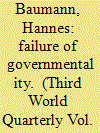

|
|
|
|
|
| Summary/Abstract |
This article critiques the Foucauldian approach to governance indicators. Transparency International’s (TI) Corruption Perceptions Index (CPI) underestimated Tunisian corruption levels under President Ben Ali: his regime was highly corrupt but foreign investors were less affected. CPI methodology meant it reflected primarily the needs of foreign investors. The Foucauldian approach specifically excludes analysis of governance indicators’ methodologies. It thus fails to demonstrate the effectiveness of governance indicators as a technology of government, and it fails to show how the production of the CPI is embedded in a wider global political economy.
|
|
|
|
|
|
|
|
|
|
|
|
|
|
|
|
| 6 |
ID:
151505
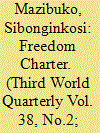

|
|
|
|
|
| Summary/Abstract |
The Freedom Charter represents a desire to create a society that is based on common citizenship and democracy in a society divided in all aspects of its life. This paper problematises and interrogates the Charter’s theoretical and philosophical claim on land. It uses the methodology of Afrocentricity and Africana critical theory to dispute the theoretical and philosophical basis of the Freedom Charter. The paper argues that the understanding, desire and vision of the Freedom Charter are irreconcilable. It concludes that the Charter reconciles the dispossessed with their dispossession, reflecting coloniality and white domination in South Africa.
|
|
|
|
|
|
|
|
|
|
|
|
|
|
|
|
| 7 |
ID:
151504
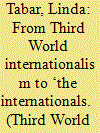

|
|
|
|
|
| Summary/Abstract |
This paper examines the formation of the concept of ‘the internationals’ in Palestine. The post-Oslo term began to be used in the second intifada to denote white solidarity activists in the colony. In tracing the rise of the concept, the paper charts some of the ways solidarity with the Palestinian people has been domesticated under the Oslo ‘peace process’. Situating and analysing the rise of the concept of ‘the internationals’ within the assemblage of apparatuses and ideological forces inscribed during Oslo, it explains how these material structures have contributed to shifting the notion and praxis of solidarity. Taking Third World internationalist and anti-imperialist feminist practices of solidarity as its starting point, the paper historicises and theorises some of the changes that have taken place over time. It offers an anti-colonial, anti-racist, feminist critique of the individualisation of solidarity and centres indigenous Palestinian perspectives. It concludes by surveying the ways Palestinians are creating alternatives and rebuilding international solidarity.
|
|
|
|
|
|
|
|
|
|
|
|
|
|
|
|
| 8 |
ID:
151501


|
|
|
|
|
| Summary/Abstract |
Regional and hemispheric reconfigurations in Latin America and the Caribbean are increasingly mediated by Brazilian power, and the engagement of Guyana, Suriname and French Guiana with this emerging context is intriguing. They are tentatively moving away from a Caribbean region with which they are culturally contiguous, towards a South American continent in which they are geographically located. This is partly a reflection of the gradual opening up of the Northern Amazonian space that they share collectively, and also with Venezuela and Brazil. These processes are occurring as cause and effect of Brazil’s emergence as a regional – and even regionally hegemonic – power. With reference to wider debates on regionalism and hegemony, we analyse the uncertain consequences of these shifts.
|
|
|
|
|
|
|
|
|
|
|
|
|
|
|
|
| 9 |
ID:
151498


|
|
|
|
|
| Summary/Abstract |
This paper draws on constructivist theory to assess the contemporary debate around inclusion within peace-building and state-building processes and on inclusivity as an emerging norm within international policy processes. Within the wider context of an ongoing but still incomplete normative shift in terms of how peace building is both understood and practised, it focuses on the case of the New Deal for Engagement in Fragile States, and makes the case that the inclusivity agenda marks a significant shift towards fulfilling a longstanding commitment to respecting national ownership of peace-building processes.
|
|
|
|
|
|
|
|
|
|
|
|
|
|
|
|
| 10 |
ID:
151509
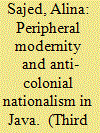

|
|
|
|
|
| Summary/Abstract |
This analysis investigates the limits of colonial modernity in the 20th century Dutch East Indies at a time that coincided with the building of the Indonesian national project. I am interested in the constitution of the national teleology as an inexorable socio-political project, deploying specific racial and gendered economies. As a locus of investigation I choose the literary narratives of two celebrated Indonesian intellectuals (and participants in the anti-colonial struggle), Pramoedya’s Buru Quartet and Mangunwijaya’s Durga/Umayi. Were the impulses of anti-colonial resistance intrinsically national in their orientation? Through what erasures and re-appropriations has the nationalism/modernity paradigm become the medium of decolonisation?
|
|
|
|
|
|
|
|
|
|
|
|
|
|
|
|
| 11 |
ID:
151508


|
|
|
|
|
| Summary/Abstract |
This paper discusses disaster resilience in the context of disaster risk reduction. It focuses on how the Nepali state, through disaster risk reduction and resilience strategies, is reinventing the ‘diversity’ question in Nepal. Disaster risk management and disaster risk reduction are being used to create a specific form of national identity that paradoxically both segregates and excludes ethnic and traditional communities through a variety of strategies of paternalism and inclusivity. The emerging state-led use of exploiting and capturing ethnic and indigenous ‘traditional knowledge’ is part of the government’s disaster risk strategy. This is sanctioned by multilateral bodies, which further legitimates subtle practices of exclusion through state-led monitoring. This has wider implications for contested narratives on Nepali democracy and federalism.
|
|
|
|
|
|
|
|
|
|
|
|
|
|
|
|
| 12 |
ID:
151500
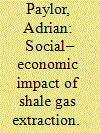

|
|
|
|
|
| Summary/Abstract |
This article explores the global social–economic impact of shale gas extraction, comparing the differing social and economic impacts shale gas extraction may have on communities in developed and developing countries. It argues that the benefits of fracking are more likely to be enjoyed by communities in highly and very highly developed countries rather than by those in countries with low or medium levels of development . Additionally, it shows that the potential risks and drawbacks of shale gas and its extraction are more likely to be experienced by communities in these latter countries than by those in highly or very highly developed countries. However, it also demonstrates that even communities in developed countries are vulnerable to environmental and health risks associated with shale gas extraction.
|
|
|
|
|
|
|
|
|
|
|
|
|
|
|
|
| 13 |
ID:
151506


|
|
|
|
|
| Summary/Abstract |
An increasing number of children are actively participating in armed groups, drawing attention to the issue of child soldiering from both international humanitarian organisations and the academic community. Despite this interest, there is a lack of explicit attempts to bring the insights of these two arenas together. More specifically the theoretical issues raised by the scholarly community have not been incorporated into disarmament, demobilisation, and reintegration (DDR) practices. This article combines these two arenas to show that questions related to age, gender, agency and the recruitment of child soldiers in particular have not yet been resolved, leading to problems in the implementation of child-centred DDR programmes.
|
|
|
|
|
|
|
|
|
|
|
|
|
|
|
|
| 14 |
ID:
151502
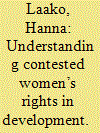

|
|
|
|
|
| Summary/Abstract |
This article builds on the recent debates on human rights and development to discuss the case of reproductive rights and midwifery activism as part of the broader mobilisation for the humanisation of birth and against obstetric violence in Latin America and Mexico. Drawing on extensive fieldwork, the analysis shows how human rights continue to form a significant contentious and constructed terrain among women in the global South. The mobilisation for the humanisation of birth and against obstetric violence indicates how the clinical developmental view of reproductive rights is challenged by these activists as not necessarily safeguarding the rights of women during birth. In Mexico this campaign is essentially linked to the struggle to bring back and strengthen midwifery as a way of ensuring improved human rights in birth. The article concludes, however, that this campaign might be challenged by Indigenous rights in the near future.
|
|
|
|
|
|
|
|
|
|
|
|
|
|
|
|
|
|
|
|
|